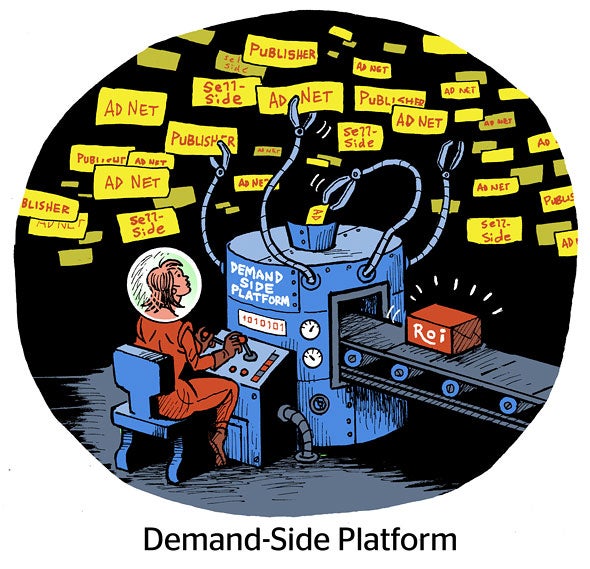That thud you just heard?
The latest Adalytics report dropped on Wednesday.
The spotlight this time is on media sellers with masses of user-generated content (UGC), including movie and video review forums with unmoderated comment and discussion sections.
Examples include Fandom, Tumblr, Metacritic, Dailymotion, Genius, Urban Dictionary (which you might expect) and even the Merriam-Webster Dictionary site.
However, the report is less about calling out those media properties for any kind of bad behavior. It’s not at all surprising that UrbanDictionary.com contains unsuitable pages – it documents slang and curses – not to mention Genius, which reproduces song lyrics, or Tumblr, a free-for-all feed of crazy images.
The real focus is on the verification providers – namely, Integral Ad Science and DoubleVerify – and other pre-bid product solutions that allow brand-unsafe pages to slip through their filters.
On Fandom, for instance, programmatic ads were observed on pages that include N-bombs or references to sex with horses – even in cases where those words appeared right in the URL. These pages were rated as brand safe by IAS, which one can see from the source code. This is despite the presence of adult content, violence and hate speech. (IAS includes ratings in the JavaScript site code for different brand safety metrics it tracks, whereas DV does not.)
The report also calls into question retail media and walled garden DSPs – including Amazon, Walmart Connect, Target Roundel, ShopRite, Petco and Best Buy – that are expanding verification vendor services, but without the transparency advertisers are accustomed to on the open web.
A problem of scale
Adalytics Founder Krzysztof Franaszek began digging into these particular media sellers after a large brand’s head of global media requested a review of brand safety standards, he writes in the report’s intro. The brand had been given 100% assurance by its DSP and verification vendors that its placements were suitable.
DoubleVerify contends that no marketer would ever end up with this type of supply in their media mix – at least not much.
“The outcomes are manipulated, and lack any organic validity or scale,” according to DoubleVerify’s blog post in response to the report.
In other words, DoubleVerify is accusing Adalytics of “arbitrarily” identifying pages with unsuitable language and images and engineering situations to generate ads to populate the report.
Fandom is a major programmatic inventory source. An advertiser buying across the open web will end up with a fair bit of Fandom in any given campaign. In the vast majority of those cases, nothing like what Adalytics documents in its report was served to the brand, according to DV and Fandom execs, speaking separately on background.
“To be clear, no customer has expressed concerns about the accuracy of our content categories,” DoubleVerify contended in its reaction blog post.
On the other hand, DoubleVerify’s response illustrates a big part of the problem. DV and IAS both boast in marketing material and elsewhere of providing 100% suitable placements. Clearly, though, it’s not 100%.
Likewise, when DV says no customer has ever expressed concerns about the accuracy of its content categories, that is counterbalanced by the many publishers who more than grumble about that very topic.
AdExchanger also spoke with half a dozen agency buyers and brand marketers this week who expressed grave reservations with the accuracy of the classifications provided by verification vendors.
The hidden target
Retail media network advertisers appear particularly affected.
Peruse the screenshots of ads in the report and you’ll find a surprising mix of grocery brands, like Fruity Pebbles at Target and Greenies dog treats at Petco. Recreating the impressions in incognito mode, AdExchanger observed ads for Horizon organic milk for sale at ShopRite, Lunchables from Walmart and major brand electronics at Best Buy.
Those brands’ DSP partners aren’t serving ads to these placements – but a retail media network is.
A past Adalytics report from March detailed how Google, Amazon and Microsoft were serving a vast amount of ads into MFA inventory. The open web gets the blame, however, because that’s where the problem is most visible.
In some cases, what we’re really seeing is an attribution sleight of hand. Retail media and walled gardens target individuals on cheap, scammy sites and yet still claim credit for a purchase within a given attribution window.
But cruddy inventory and bad practices persist where there is no transparency.
Consider the fact that the most recent Adalytics report doesn’t mention Reddit, despite the fact that it’s full of brand-unsafe content and at far greater scale than Fandom. But that’s because Reddit is a walled garden that doesn’t allow third-party JavaScript. Adalytics can’t examine those log files, because they don’t exist.
Meanwhile, DV and IAS have been racing to sign partnerships with Reddit, Snapchat, TikTok, Meta, YouTube and Amazon for pre-bid brand safety solutions. These solutions enable 100% brand-safe placements, according to the marketing and in the platform ad campaign reports, as agency and brand marketers put it to AdExchanger.
And that brings us to the real takeaway.
The lesson for advertisers here doesn’t really have to do with Fandom or Tumblr – or even specifically with DV and IAS.
The message is not to trust any ad tech provider or programmatic campaign report that claims to be 100% safe. Especially when you can’t see the log files.













